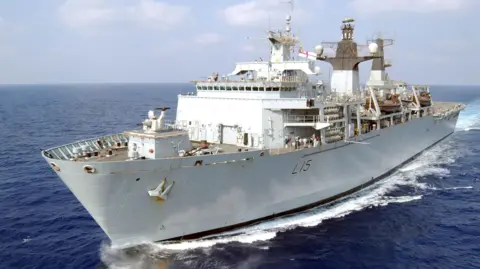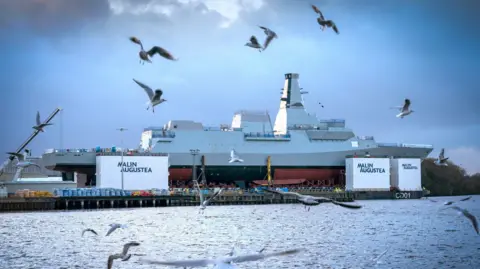New ships will help fight future wars - Shapps
 MOD/ PA
MOD/ PAUp to six amphibious warships planned for the Royal Marines will help fight the "conflicts of the future", Defence Secretary Grant Shapps has said.
Speaking to the BBC, he said the ships would be "more flexible" and capable of carrying out different tasks.
He added that the investment was only possible because of the government's decision to increase defence spending to 2.5% of national income.
The government had previously said it would be building the new ships.
However Mr Shapps told the BBC's Today programme, that at that time there was not the "means to actually do it".
"Today, we are able to bring those plans to fruition."
He said three ships would "definitely" be built and there were "plans to construct the next three".
He added that the commitment to build up to six multi-purpose ships represented a "golden era of ship building".
It brings the number of warships and submarines in construction or being planned up to 28:
- Eight of the ships are Type 26 Frigates, of which the first three will enter service before 2030
- Five are Type 31 frigates, due to be in the fleet by 2030
- Two Astute Class submarines are currently under construction
- Four Dreadnought Class submarines will carry the UK's nuclear deterrent when they enter service in the early 2030s
- The last three are Fleet Solid Support ships, which are scheduled to begin production next year and due to enter service by 2031
HMS Albion and HMS Bulwark will remain in service for nearly a decade, while the six new amphibious warships are built to replace them.
These ships - known as Multi Role Support Ships - will be designed to transport the Royal Marines Commando Force to coastlines to conduct special operations and be able to provide urgent medical care to forces.
 PA
PAMr Shapps said: "We're learning from what's happened in the Black Sea in Ukraine and learning what's happening in the Red Sea currently to make much more flexible ships capable of carrying out a lot of different types of tasks."
First Sea Lord, Admiral Sir Ben Kay said: "These will be the most capable amphibious warships the nation has ever owned, designed to be fully interchangeable with our closest allies in Europe, and in Nato."
Earlier this year, an MPs' committee warned the credibility of the UK's armed forces was being undermined due to recruitment problems.
Mr Shapps said recruiting and retaining people was one of his priorities and that numbers applying to join the armed forces was increasing.
Speaking later at a conference, he said new ships could also be run by smaller crews.
The commitment to build more ships comes after Rishi Sunak promised to increase defence spending to 2.5% of national income by 2030.
The government has said it would meet its 2.5% pledge by shrinking the size of the civil service, but some think tanks - including the Institute for Fiscal Studies - have said cuts in other areas will be needed to meet the spending commitment.
Last month, the government announced it would provide an additional £500m to Ukraine, on top of the £2.5bn allocated for this financial year.
Mr Shapps said Russia's renewed incursion in north-east Ukraine was a "wake-up call" adding: "This was going to happen due to the delays in getting Ukraine what they needed" in terms of military equipment.
"My simple message is to the world, and in particular to the United States now given the package that has passed Congress, not only is it the right thing to do, it's a lot cheaper to defend and therefore deter Putin here and now than it is to allow him to win."
Labour has also promised to meet the 2.5% target, but have not set a deadline, instead saying it would happen when economic conditions allow.
On Monday, the party's shadow defence and foreign secretaries John Healey and David Lammy visited the Ukraine capital of Kyiv, where they met the head of the President's Office Andriy Yermak and Defence Minister Rustem Umerov.
The pair promised that a Labour government would have an "iron-clad commitment" to supporting Ukraine in its fight against Russia.
